California
Brief Synopsis
Cast & Crew
John Farrow
Ray Milland
Barbara Stanwyck
Barry Fitzgerald
George Coulouris
Albert Dekker
Film Details
Technical Specs

Synopsis
During the California gold rush, a wagon train guided by ex-Army lieutenant Jonathan Trumbo, a deserter, stops in a small town, where Lily Bishop, a woman traveling alone, is thrown out of the saloon and accused of cheating at poker. Lil asks to join the wagon train, but because Trumbo refuses to take her, kindly old farmer Michael Fabian invites her to ride with him. Throughout the journey, Trumbo is unkind to Lil and she is snubbed by the women. When Lil beats Trumbo at poker one night, he accuses her of cheating. Later he kisses her, but she swears revenge. When news arrives that gold has been found in California, the pioneers abandon their goods and hurry West, and Lil leaves with a rough man named Booth Pennock, determined to make her own fortune. Trumbo tries to apologize to Lil, but Pennock whips him as they ride out. Fabian nurses Trumbo's shoulder and drives him West. Some time later they arrive in Pharaoh City, run by ex-slave trader Pharaoh Coffin, who is determined to make California an independent nation state so that he can rule. In the Golden Lily Saloon, owned by Lil, a farmer named Whitey tells Trumbo that Coffin has been forcing the farmers off their land by charging exorbitant prices for water and protection. Lil rescues Trumbo from a brawl with Pike, Coffin's henchman, but when Trumbo awakens, Lil warns him never to set foot in her saloon again. Later, Trumbo wins Lil's saloon at poker. After he resists Coffin's orders to join his gang, Trumbo is beaten and put on a horse, and following his rescue by two Mexicans, he vows revenge. Meanwhile, Lil moves into Coffin's hacienda. Hoping to convince the state's politicians to resist statehood, Coffin hosts a fiesta, while secretly planning an armed seizure of government property. When Trumbo warns an army captain about the seizure, he is reminded that, as a deserter, he could be court-martialed if Coffin proves to be innocent. Trumbo is given ninety days to find a spokesman for California statehood to appear at the Monterey Convention, where he will be elected as the state's advocate, and the issue of statehood will be decided. Trumbo picks Fabian, and he is elected spokesman. Although Lil warns Fabian that he will be killed if he contravenes Coffin, he gives a speech indicting Coffin for trying to make California an "independent empire." One of Coffin's men tries to shoot Fabian, but a loyal farmer takes the bullet. After Trumbo shoots the assailant, Coffin's supporters abandon him, and Lil sees his treachery for the first time. The next morning, at his hacienda, Coffin asks a padre to marry him and Lil, but she has fled to warn Fabian. She is too late, however, as Fabian is killed in his vineyard by Coffin's gang before Trumbo and his posse arrive. At the hacienda, Trumbo finds Coffin hallucinating that the slaves on his ship have freed themselves and are about to kill him. Lil shoots Coffin and saves Trumbo. Later, they visit Fabian's grave, where Trumbo tells Lil that he will return to the army, and she promises she will wait for him.

Director
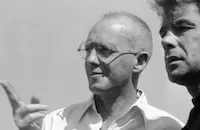
John Farrow
Cast

Ray Milland

Barbara Stanwyck

Barry Fitzgerald

George Coulouris

Albert Dekker

Anthony Quinn
Frank Faylen
Gavin Muir

James Burke

Eduardo Ciannelli

Roman Bohnen
Argentina Brunetti

Howard Freeman
Julia Faye
Crane Whitley
Joey Ray
Tommy Tucker
Frances Morris
Minerva Urecal
Virginia Farmer
Dock Mcgill
Sam Flint
Stanley Andrews
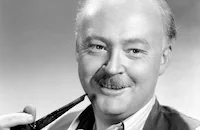
Don Beddoe
Harry Hayden

Ian Wolfe
Phil Tead
Jack Baxley
Kathryn Sheldon
Ethan Laidlaw
Gertrude Hoffman
George Mcdonald
Billy Andrews
Gary Armstrong
Eddie Ehrhart
Albert Ray
Diane Ervin
Janet Thomas
Alan Bridge
Bud Geary
Dick Wessel
Tom Fadden
Guy Wilkerson
Ed Randolph
Rex Lease
Frank Hagney
George Magrill
Pepito Perez
Wesley Hopper
Lester Dorr
Al Ferguson
Robert R. Stephenson
Phil Dunham
Philip Van Zandt

Harry Cording
George Anderson
Joe Bernard
Stanley Blystone
William Hunter
James Davies
George Lloyd
Jack Clifford
Joe Whitehead
Perc Launders
Leroy Taylor
Joe Gilbert

Lee Phelps
Jimmie Dundee
Jesse Graves
Kernan Cripps
Hal Brown
Clancy Cooper
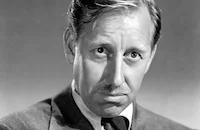
Frank Ferguson
Francis Ford
Si Jenks
Louis Mason
George Barton
Darby Jones
Leroy Edwards

Will Wright
Tony Paton
Fredric Santley
George Melford
Len Hendry
Tom Chatterton
Dave Kashner
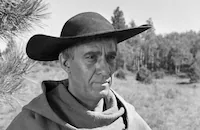
Martin Garralaga
Pedro Regas
Betty Farrington
John Sheehan
Eddy Chandler
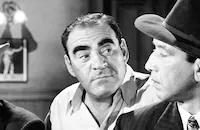
Ralph Dunn
Lane Chandler
Russ Clark

Jeff Corey
William Hall
Sheik, A Horse
Crew
Roland Anderson
Phil Boutelje
Robert Brower
Frank Butler
Dr. John Walton Caughey
Herbert Coleman
Sam Comer
Stanley Cooley
John Cope
Arch Dalzell
Hans Dreier
John Farrow
E. Y. Harburg
Edith Head
Lorne Holmes
Boris Ingster
Devereux Jennings
Gordon Jennings
Natalie Kalmus
Joe Keller
Roy Kreuger
Ken Lane
Paul Lerpae
Seton I. Miller
Mickey Moore
Ray Moyer
Helen Gladys Percey
Ray Rennahan
Earl Robinson
Jim Rosenberger
Elvira Smith
Gile Steele
Theodore Strauss
Eda Warren
Wally Westmore
Philip G. Wisdom
Victor Young
Joseph Youngerman

Film Details
Technical Specs

Quotes
No court would try you, Captain, because no one would hold that a black was a man. He was an animal which you beat and chained, and all he had to offer up against you was a prayer.- Johnny Trumbo
Bilge, Mr. Trumbo, bilge. Most men love the chains they wear. They need a master the way they need their mothers. I've heard such talk from pulpits, "the meek shall inherit the earth." No, Mr. Trumbo, the earth belongs to the men who make the law, and the law belongs to the men who can lay it down.- Pharaoh Coffin
Trivia
Notes
According to Hollywood Reporter pre-production news items, screenwriter Albert Hackett was originally scheduled to direct and write this film, but was later replaced. Hackett remained a screenwriter and never did direct a feature film. In June and July 1945, Alan Ladd and Betty Hutton were scheduled to star in the film. By September 1945, Hutton had declined the role in order to go on her honeymoon. Ladd was suspended by Paramount as of August 22, 1945 for refusing to report for preparatory work on the film after studio heads refused him more money. By early November 1945, Ladd and the studio settled their dispute, but Ray Milland had already been put into the film. Hollywood Reporter also reported that Victor McLaglen was slated for a role as a "heavy" in this film.
Portions of California were shot in Flagstaff and Cameron, AZ, at the Iverson Ranch near Chatsworth, CA, and in Calabasas, CA. As reported in Hollywood Reporter on March 1, 1946, scenic California locations were shot in early March 1946 for scenes illustrating the lyrics of introductory music for montages in the film. Among the montage locations were: the Monterey coastline, the Golden Gate Bridge in San Francisco, highway scenes of California redwood forests, the San Juan Capistrano Mission, orange groves at San Bernardino, wild flowers near Bakersfield, the snow-capped mountains of Mount Whitney, San Jacinto and Mount Baldy, peach and apple orchards at Santa Clara and Santa Rosa, and vegetable fields at Bakersfield and in the Imperial Valley. According to an article in the New York Times on January 13, 1946, Paramount recreated a vineyard at Brent's Crags, CA. According to New York Times, vintage Conestoga wagons were used in the film. According to Par News, at the advice of Dr. John Walton Caughey, UCLA history professor, no white-faced Hereford cattle were used in the film because they were not bred in the United States until after the 1840s. The amethyst tiara and necklace worn by Barbara Stanwyck in the film were heirlooms of director John Farrow.
According to a March 22, 1946 Hollywood Reporter news item, because 1946 marked the centennial of the United States' seizure of California from Mexico, Farrow arranged an advance showing of this film in Sacramento for California Governor Earl Warren, heads of the Native Sons and Daughters of the Golden West, and other state leaders. The date of the actual preview was not found, but on January 27, 1947, Daily Variety reported that California historical societies were angered that Paramount had held the film's premiere in New York (on 14 January 1947), particularly because California was preparing to celebrate the 100th anniversary of the discovery of gold in Northern California and its adoption into statehood. Paramount reportedly held a special premiere in Monterey, CA two weeks after the New York premiere in response to the protest. Ray Milland and Lizabeth Scott appeared in a Lux Radio Theatre broadcast of California on January 30, 1950.

Miscellaneous Notes
Released in United States Winter February 21, 1947
Released in United States Winter February 21, 1947











